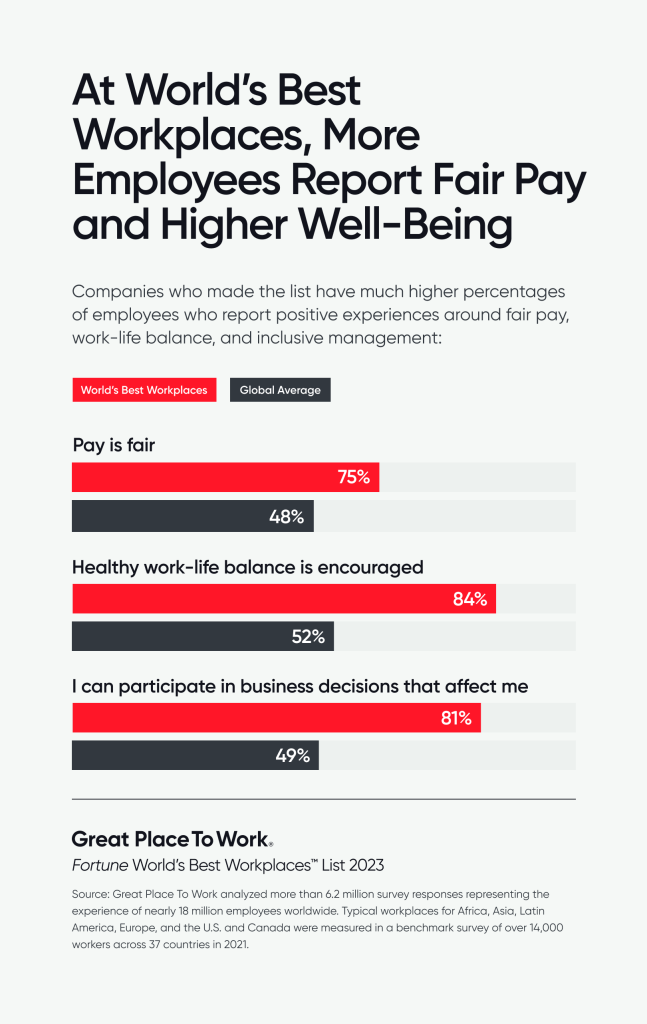The 2023 World’s Best Workplaces make strong case for building trust with workers
The basic elements of a positive employee experience don’t change depending on where in the world you live.
Employees in Latin America need the same things from their managers and colleagues as employees in Europe or Asia: trust in leaders, pride in their work, and connection to coworkers.
Great Place To Work® analyzed more than 6.2 million survey responses representing the experiences of 18 million workers around the world to find the 25 companies on this year’s Fortune World’s Best Workplaces list.
These companies easily beat the typical global workplace experience. At winning companies, 90% of employees reported having a great workplace, compared to a little more than half for most regions of the world.
“It doesn’t matter what country or continent you call home,” says Michael C. Bush, CEO of Great Place To Work. “What matters is the trust companies build with their employees. High-trust workplaces listen to all their people, innovate, adapt, measure, and repeat.”
All around the world, having a great workplace is life-changing for employees.
“We have data that proves that some great companies create an experience for underrepresented people that is better than their other experiences in their country,” Bush says. “When businesses create a great place to work and live for all, it is measurably better for the world.”

To be eligible, companies must operate in three or more countries, employ at least 5,000 workers globally with 40% or 5,000 employees outside their headquarters country.
This year’s list was more competitive than ever, with a 28% increase in companies participating in the global survey from 2022, and a 40% increase in the number of surveys received.
The 25 winning companies had a larger percentage of workers reporting fair pay (75%), healthy work-life balance support (84%), and a voice in decisions that affected their lives (81%), compared to the typical global workplace.
At winning companies, 88% of employees would recommend their employer to friends and family—34 percentage points higher than the global average of 54%.

What “great” looks like
Here are some of the ways companies on the list are investing in their employees and creating experiences that drive stronger business results:
1. Involve employees in decisions that affect them.
Hilton, the new No. 1 on this year’s list, ensures that employees have their voices heard when making decisions that affect them.
In Central and Latin America, Hilton launched “My Voice Matters,” an eight-week listening campaign where leaders received feedback from over 5,000 team members. A commitment to listening is why 84% of Hilton employees say management involves them in decisions that affect them—three percentage points higher than the average for all winning companies.
2. Ensure every employee has a fair, engaged manager.
At the World’s Best Workplaces, 79% of employees say their manager doesn’t “play favorites—and at Cadence, No. 9 on the list, it’s 86%. To accomplish this, Cadence has 90% of its managers around the world complete unconscious bias and allyship trainings.
Cadence’s focus on developing its managers is epitomized by its mentorship program, which came out of work with its employee resource groups (ERGs). By supporting both mentors and mentees, the company is able to build deep trust between workers and management.
3. Encourage every employee to find a healthy work-life balance.
At Atlassian, No. 16 on this year’s list, 94% of employees say they are encouraged to find a healthy work-life balance, 10 percentage points higher than the average across winning workplaces.
One of the extraordinary things Atlassian offers is a distributed-first work environment. Employees are not required to work from an office and can spend 90 days a year working away from their permanent work location. Teams are oriented around time zones, with team members maintaining an overlap of at least four hours each workday to support collaboration.
Remote work isn’t a panacea for the employee experience, but the way Atlassian enables remote teams offers a level of flexibility that its team members value deeply.
4. Connect every employee to meaningful work..
At the DHL Express, No. 2 on the list, 90% of employees report feeling that their work is more than “just a job.”
That’s in part due to company efforts to support the communities where it operates, spending 1% of net profit each year giving back. Some examples of this commitment are how DHL helps refugees find a new start with the company, or efforts to shrink its climate footprint.
To ensure every employee feels connected to the company mission, countries are asked to cascade information and engage employees around the question of purpose. For example, in the Americas, employees were asked to upload their own personal purpose to start a conversation around how every employee contributed to the big picture goals for the organization.
Learn more about these winners and submit your company to make a Best Workplaces™ list by visiting the Great Place To Work website.


Ted Kitterman is a content manager at Great Place To Work®.
This story was originally featured on Fortune.com
